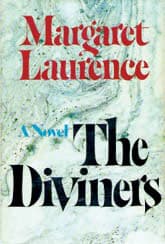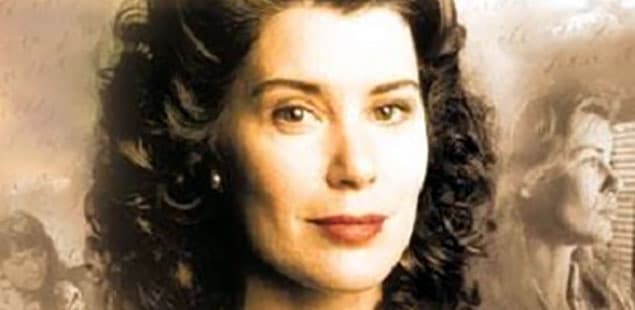The Diviners
Critique • Quotes • At the movies
 First edition
First editionFirst publication
1974
Literature form
Novel
Genres
Literary
Writing language
English
Author's country
Canada
Length
Approx. 182,000 words

Sonja Smits takes on the Morag role as the independent woman grows up inThe Diviners.
Ramble through a life
The Diviners (1993): Television film, 117 minutes; director Anne Wheeler; writer Linda Svendsen; featuring Sonja Smits, Tom Jackson, Wayne Robson
Given the status of Margaret Laurence's The Diviners in Canada, it may be surprising that only a TV movie has ever been based on it (and not released on DVD, as far as we can tell). Her lesser known A Jest of God was made into the cinematic Rachel, Rachel by Paul Newman, and a film adaptation of her best-known novel, The Stone Angel, was recently released.
But this TV film shows the difficulties faced in bringing Laurence's big book to the screen. By some accounts it was a terrific success—nominated for eight Geminis (Canadian version of the Oscars), winning four. And it's relatively faithful to the novel, as these things go. Very earnest. Very progressive in exposing prejudice against native people and the restriction of women.
But, for long stretches, somewhat dull.
The Diviners film is predictable for the most part, yet never comes to an overall climax. Even though I knew the novel, I was surprised when the ending of the movie came. An ending of acceptance. Everyone finds his or her own peace. I was left still expecting some big emotional showdown—some kind of pay-off.
I suppose the pay-offs are supposed to have come along the way, with all the steps Moraq has taken in becoming a writer, finding love, working out a relationship with her daughter. But these passed by too quickly in the attempt to fit each episode into the two-hour script.
My favourite scenes are with young Moraq (Mairon Bennett) and her foster father Christie (Wayne Robson), the loving garbage picker who fills her head with fanciful stories of her heritage, as well as with the outcast but cocky young Métis, Jules "Skinner" Tonnerre (Dakota House). This bodes well as Sonja Smits and Tom Jackson take over the grown-up Morag and Skinner roles.
But too soon we're moving on to Moraq going away to university, her marriage to a professor, the falling out, her attempts to get published, her success, her on-again, off-again romance with Skinner...and her on-again, off-again daughter. The latter subplot of the quarter-breed girl trying to find her identity amid the upheaval of the 1960s counterculture is frankly an annoying distraction. It would have been better to devote the time to the tragic Moraq-Skinner affair.
And Smits is too coldly beautiful and serene an actress to really get across the mercurial Moraq. Too much staring out windows across landscapes. Not enough spit and vinegar. She shines though with Jackson, whose own calm is of a different sort, somehow radiating danger.
Overall this sounds like a pan but that's only in reaction to higher hopes. Some of the film's weaknesses I think can be traced to weaknesses in the rather rambling, only occasionally focused, novel—made clearer actually by the compressed movie format. Still, just as the novel, warts and all, is a reflection that Canadians have taken to their hearts, so may the film be accepted as an honest attempt to see ourselves, rambling and only intermittently focused as we are.
I can't imagine what others might find in it.
— Eric

